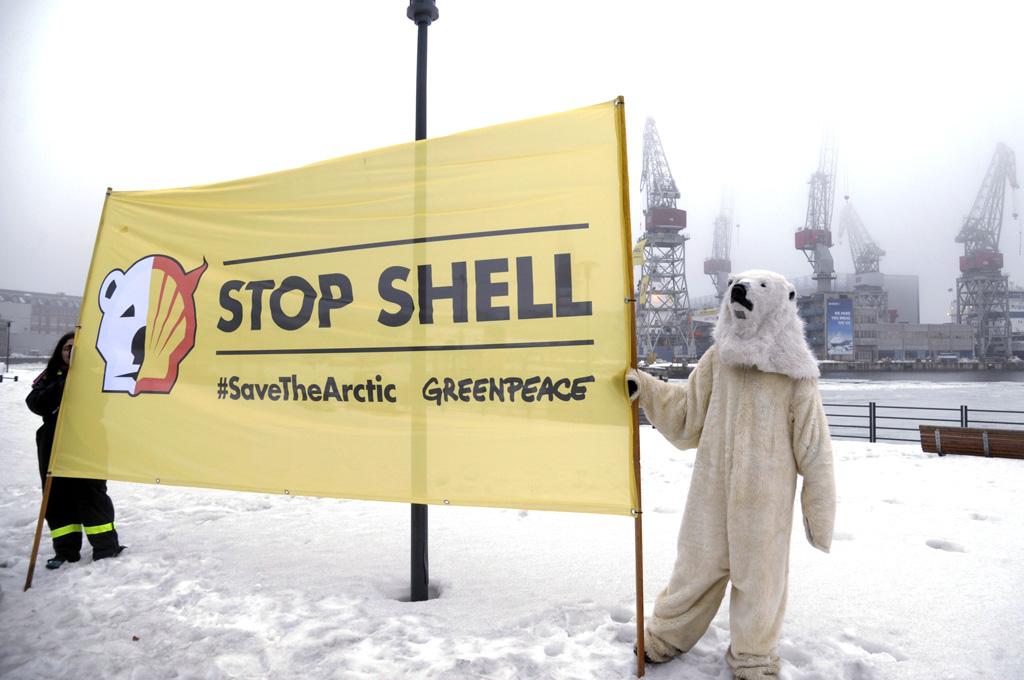Drilling in the Arctic: is it inevitable?
Greenpeace activists demonstrate on March 16, 2012 in the port of Helsinki as other activists occupy a Shell-contracted icebreaker preparing to sail for the Arctic. Fennica and Nordica, two Finnish icebreakers whose main task is to secure shipping in the Baltic Sea, have been leased out to Shell for the summer seasons of 2012, 2013 and 2014 to help Shell drill in the Beaufort and Chukchi seas off Alaska.
MEDFORD, Mass. — Jarring is one way to describe the image that spilled across newspapers, websites and TVs over the New Year. The towering drill rig Kulluk bobbed like a bath toy off Alaska’s Kodiak Island, battered by some of the most punishing weather conditions on the planet.
Last week, the rig’s owner, Royal Dutch Shell, cited the mishap as one of the reasons for suspending its billion-dollar plans to drill in the Arctic Sea off Alaska. Environmentalists cheered. Oil industry specialists groaned.
The rig and the Arctic: a collision of human ingenuity and brutal nature in the quest for the fuel of the 21st century global economy. Is it worth it?
By some estimations, that question may already be moot. With nations like Russia, the United States, Canada, Norway and others staking out claims to subsea riches, oil and gas exploration may be foregone conclusion.
With Arctic sea ice receding at record levels, the more relevant questions may be: how frequently will these sorts of evens happen in the future? How inevitable are catastrophes in the future? How likely are clashes between nations competing for the region’s vast oil, gas and mineral resources?
These were some of the questions addressed at the 2013 Energy Conference on Sunday, hosted by Tufts University. “The lure of riches in the Arctic draws ever more companies and nations,” said William Moomaw, a professor of international environmental law at the Fletcher School of Law and Diplomacy. “And so far it’s been relatively amicable jousting and jostling there.”
The Kulluk incident focused new attention on the question of Arctic oil and gas drilling. The US Geological Survey estimates more than a fifth of the world’s undiscovered, recoverable oil and gas lie under the harsh, frigid and remote conditions above the 66th Parallel North.
Doug Helton, operations coordinator with the National Oceanic and Atmospheric Administration’s Office of Response and Restoration said Shell’s decision to suspend Arctic drilling was significant, because the oil giant was furthest along among companies planning to drill in US Arctic waters.
But as Helton and others point out, it’s just temporary. The drilling will happen eventually, and the thing to do is to use the breathing room provided by the suspension to come up with contingency plans for oil spills, because they will happen, he said to conference participants at a panel called ‘Arctic Anxiety’.
“If we’re going to extract Arctic resources, we have to be prepared,” he said. “Let’s build a fire truck before the fire starts. We can’t wait until the spill happens to develop these technologies.”
There are plenty of developments in the Arctic that have the potential to reshape economies, livelihoods, geopolitics and ecologies. For example, receding sea ice means a longer shipping season along routes through the Northwest Passage and the Northern Route.
For Russia, this is a game-changer: Russia, with the world’s largest ice-breaking fleet (nuclear or otherwise), according to US Coast Guard Data, is well poised to take advantage of shorter shipping times from East Asia to Europe. Moreover, the receding sea ice will open vast stretches of the Russian Arctic coast.
“For Russia, their perspective on the Arctic is like the American perspective on the West. The north is important to Russia. Beyond the resources, it is a core of their being,” said another panel participant, Caitlyn Antrim, executive director of the Rule of Law Committee for the Oceans.
“The key thing of the Russian development of the Arctic is that it has the potential to transform this enclosed heartland into another maritime state,” she said.
For now, the eight nations that ring the Arctic – the United States, Canada, Iceland, Denmark, Norway, Finland, Russia, Sweden— have all but dominated the discussion of where things are headed, as GlobalPost reported in its Special Report, "The Arctic Melt." These countries are beefing up icebreaking fleets, setting up new naval facilities, conducting geological and fishery surveys, staking claims to undersea territory. The inter-governmental Arctic Council set up by the eight is, for the moment, a surprisingly amicable forum for related discussion, according to Malte Humpert, executive director of The Arctic Institute and other panelists.
But the geopolitical significance of the region isn’t lost on others, not the least of which is China. Beijing sent the icebreaker Snow Dragon (MV Xue Long) from Shanghai to Iceland last year along the Northern Route, and has built a swanky new, $250 million embassy in Reykjavik, Iceland.
Humpert said China would clearly like access to the Arctic’s subsea oil, gas and other resources. And Beijing wants alternate shipping routes to the crowded bottleneck between Indonesia and Malaysia, known as the Straits of Malacca.
“China wants to have a seat at the table. They want to be part of the Arctic Council. They’re an emerging power,” Humpert said. “They know that Arctic may be one of the hot spots of the 21st century.”
More from GlobalPost: Oil rig grounding a reminder of Arctic's high stakes
Every day, reporters and producers at The World are hard at work bringing you human-centered news from across the globe. But we can’t do it without you. We need your support to ensure we can continue this work for another year.
Make a gift today, and you’ll help us unlock a matching gift of $67,000!
